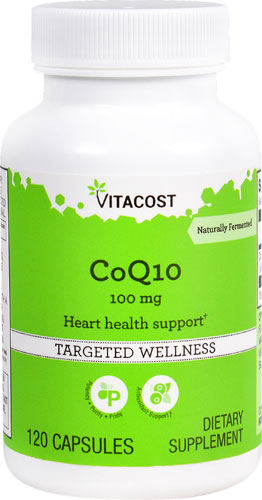Getting older is a roller coaster – in more ways than one. You may be delighted with grandchild but disappointed by the fact that you don’t have their same zip and clip. Though this is par for the course, you do have options. As you blow out those candles, you may be hearing more and more about the heart-healthy nutrient, coenzyme Q10, or CoQ10. There’s a reason for that. This vitamin-like compound is essential for your cells to produce energy and remain healthy, fully functioning cells. Need to know more about CoQ10? Just keep reading...
Courtney Kiang, RDN with The Little Clinic, answers a few common questions about CoQ10
CoQ10: What is It and What Does It Do?
Coenzyme Q10 (CoQ10) is a fat-soluble compound naturally made and stored by the body. Mostly, you’ll find it in the cells of organs that require a lot of energy, such as your heart. In addition to its role in cellular energy production, CoQ10 is well known for its ability to provide antioxidant support. Antioxidants bond to potentially damaging compounds known as free radicals to help neutralize them. If left to scavenge, free radicals could compromise the integrity of your body’s cells. Luckily, antioxidants can fight back to help cells function normally. CoQ10 supports this process, but your natural CoQ10 levels decrease with age – and can be lower in people with cancer or diabetes. You may have also heard the connection between CoQ10 and statins. Some prescription medications, like statin drugs for cholesterol management, can negatively impact levels of CoQ10 in the body.
Where is CoQ10 Found?
The main dietary sources of CoQ10 include oily fish, such as salmon and tuna, as well as poultry, organ meats and even whole grains. Other relatively rich sources include canola oil and nuts, while vegetables, fruits, eggs and dairy products are moderate sources of CoQ10. All in all, this nutrient is prolific in a balanced diet. Between what the body makes on its own and dietary sources, you likely get sufficient amounts of CoQ10. However, keep in mind: there’s no daily recommendation for CoQ10, so it’s important to eat a wide variety of foods from all food groups.
For a quick reference, here are a few select food sources with their respective amounts of CoQ10:
|
Food |
Serving |
CoQ10 (mg) |
|
Herring, marinated |
3 ounces |
2.3 |
|
Soybean oil |
1 tablespoon |
1.3 |
|
1 tablespoon |
1.0 |
|
|
Rainbow trout, steamed |
3 ounces |
0.9 |
|
Peanuts, roasted |
1 ounce |
0.8 |
|
Sesame seeds, roasted |
1 ounce |
0.7 |
|
Broccoli, boiled |
½ cup, chopped |
0.5 |
|
Strawberries, sliced |
½ cup |
0.1 |
|
Egg, boiled |
1 medium |
0.1 |
Who Might Benefit from Taking a CoQ10 Supplement?
If you are diagnosed with certain conditions, there is some evidence that a CoQ10 supplement may be beneficial. Speak to your healthcare professional about how CoQ10 may be helpful to you based on your condition and the medications you are taking.
What Are the Risks or Side Effects Associated with Taking CoQ10?
As with any medication or supplement, check with your doctor before taking CoQ10 to make sure it does not conflict or interfere with current medications, especially if you have a prescription for a heart-related condition or are taking a blood thinner. Due to limited research, CoQ10 supplements should not be taken by pregnant or breastfeeding women.
Always remember that the U.S. Food and Drug Administration (FDA) does not regulate any dietary supplements in the same way it regulates medicines. A dietary supplement can be sold with limited or no research on how well it works or on its safety.
If taking a CoQ10 supplement is right for you, they are available in softgel capsules, oral sprays, liquid formulas and tablets. CoQ10 has mild side effects and is generally well tolerated. Because CoQ10 is fat soluble, be sure to take it with food that is a source of (preferably healthy or unsaturated) fat to aid absorption.




